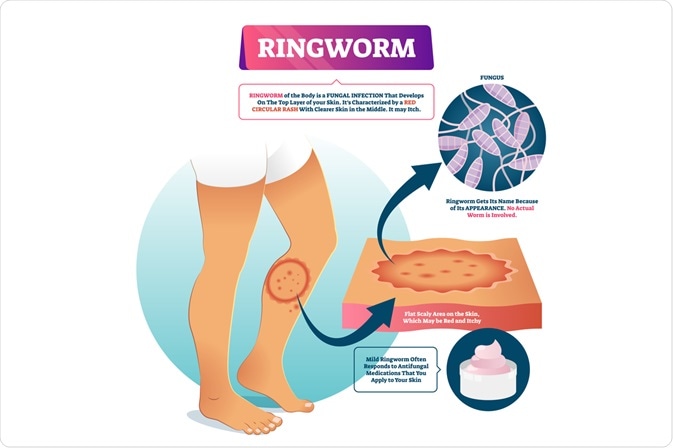Ringworm is a fungal infection that is highly infectious. The name comes from the shape of the infection which starts out as a ring of a few millimeters in size and grows to several centimeters. It is a common infection and easy to treat.
Ringworm can affect the skin of the baby on the body and the scalp. If the infection is found on the torso, it is called tinea corporis, whereas ringworm infection on the scalp is known as tinea capitis. The infection can be passed on from pets, other people, or even by playing in the soil.
Ringworm | When to Worry | Parents
Symptoms of ringworm in babies
The fungal infection starts out as a red ring on the skin and eventually develops a raised edge. The raised ring initially has clear skin in the center; however, as the ring develops scales, the inner smooth skin also changes to a red color. The crusty and raised rings can itch and the infection spreads to different areas of the body. Taken together, ringworm is a highly contagious skin condition.
Cause of ringworm
The fungi named dermatophytes are responsible for the skin infection called ringworm. These fungi can be transferred to babies from dogs, cats, guinea pigs, and other common family pets. If a person has been infected by ringworm infection, their clothes, bed linen, towels, and other contaminated items can help in transmitting the infection.
If the baby is allowed to dig around in the mud, the ringworm fungi can be transmitted from the soil to the baby. Ringworm infection that develops on the scalp can sometimes cause the affected child to experience hair loss.
Diagnosing the skin infection
The doctor may take some scrapings from the area of the infection and send it to the pathology lab to confirm ringworm. Once rings are well-developed on the skin, a laboratory test is not necessary. The rash may be painful to the touch and there may be more than one ring on the skin.

Image Credit: VectorMine / Shutterstock.com
Treating ringworm infection in babies
If the infection is not very severe, an antifungal cream can work well to clear it up. The cream should be applied to the ringworm rash at least twice a day for about a week. It is recommended to continue applying the cream to the rash area, even after it clears up, for another week to ten days to ensure that the infection is completely cured.
If the antifungal cream does not heal the rashes even after a week, or if the scalp is affected, the doctor may recommend antifungal oral medication. Oral medication is often recommended, particularly if the baby is losing patches of hair due to the infection. Ensure that the treatment begins as soon as possible, as the rash will not clear up on its own.
To help the rash heal and prevent further infection, bathe the baby regularly. The skin folds should be dried to avoid retention of moisture and the baby's fingernails should be trimmed regularly. Trimming the nails regularly helps to prevent scratching and spreading of the infection to other parts of the body. Furthermore, scratching may cause scarring, and breaking the skin can result in a secondary infection of a bacterial nature.
It is also recommended to dress the baby in loose-fitting clothes made from natural fibers like cotton. This prevents scratching and spreading of infection to other parts of the body.
Take precautions to avoid the spread of ringworm
Although it is easy to cure, prevention is always a better idea. Here are some precautions that will help prevent the transmission of this skin infection:
- Wash hands after contact with the baby using warm water and soap.
- The fungal infection spreads faster in moisture-laden areas. Ensure that her body is dried off properly to help prevent fungal growth.
- Items of personal use for an infected baby like brushes, clothes, bed linen, and hand towels should not be used by anyone else. They should also be washed and disinfected regularly while the baby recovers from the skin infection.
- Pets that may be infected should be taken to the vet and treated so that they do not pass on the ringworm infection to other members of the family.
- Good hygiene habits help prevent the spread of this infectious disease. Try and maintain a high hygiene standard for all family members where the baby has contracted ringworm, to ensure it does not spread.
References
- Babycenter, Ringworm, http://www.babycentre.co.uk/a548378/ringworm
- The Royal Children’s Hospital, Melbourne, http://www.rch.org.au/kidsinfo/fact_sheets/ringworm/
- Raisingchildren.net.au, Ringworm, http://raisingchildren.net.au/articles/ringworm.html
Further Reading
Last Updated: Apr 7, 2021